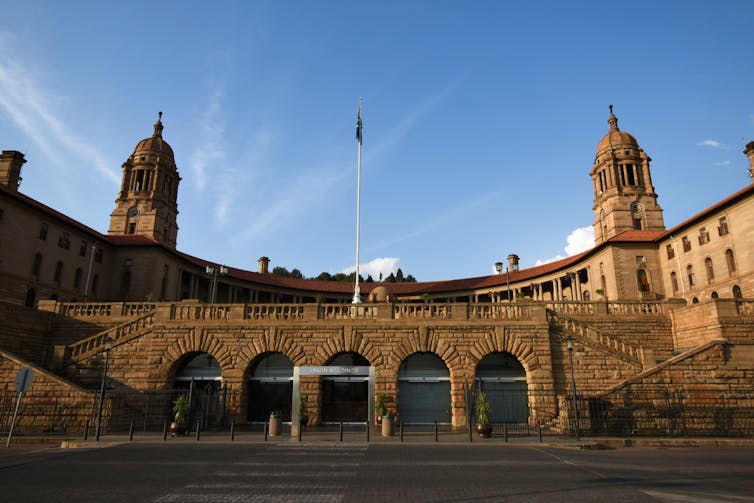- home Home
- keyboard_arrow_right CURRENT AFFAIRS
- keyboard_arrow_right Posts
- keyboard_arrow_rightSouth Africa has a new presidential advisory unit. Will it improve policy?
South Africa has a new presidential advisory unit. Will it improve policy?
By: Alan Hirsch, University of Cape Town

Shutterstock
South Africa’s President Cyril Ramaphosa is establishing a unit in the presidency which he hopes will improve policy development and coordination. This is an important initiative designed to help him address the huge challenges facing his incoming government.
There is no question that strengthening the government’s policy capacity is a priority. South African cabinet ministries are often individualistic and departments tend to operate as silos. There tends to be poor alignment, let alone coordination, of policies and programmes within national government and between the spheres of government. The president has some power to impose discipline. But this power depends on being very well-informed and well-briefed by his team.
The unit – called the Policy Analysis and Research Services – will be headed by Busani Ngcaweni, a seasoned mandarin in the Presidency. Ngcaweni was Chief of Staff when Ramaphosa was Deputy President. He had, remarkably, occupied this senior and sensitive post for four consecutive deputy presidents over a 10-year period.
Over the decade he also managed to publish around eight books of essays by himself and other writers on serious South African topics such as AIDS. Before becoming chief of staff he also served as a policy researcher in the presidency during the Thabo Mbeki era. There is no doubt that he is a committed and able intellectual, and a skilled political manager.
What is the unit intended to achieve? Can it be compared with the unit that operated during the Mbeki and Kgalema Motlanthe presidencies?
Priorities
The unit’s priority areas will be “the economy, infrastructure planning and development, agricultural development and government service delivery”. It will also lead on the National Health Insurance initiative which is designed to provide health care to all South Africans.
Ngcaweni is quoted as saying that the unit’s mandate will be:
- policy analysis and co-ordination across government and working with the forum of directors general and the cabinet;
- the co-ordination of presidential advisory councils and working groups;
- the provision of research support to the President’s advisory councils and working groups; and
- the provision of research support to the president’s advisers and co-ordination of strategic programmes like the NHI.
The unit’s role is expected to evolve over time as capacity is developed.
This is all reminiscent of the role played by a unit set up by Mbeki called the Policy Coordination and Advisory Services. I served as its chief economist and deputy head between 2002 and 2009.
But there are some differences. The earlier unit had additional responsibilities. These included preparing advisory memoranda for the President for cabinet meetings, developing a five-year strategy at the beginning of each term of government and monitoring its implementation.
It also published reports on development indicators, on policy outcomes and on political scenarios. The unit worked in close cooperation with the Cabinet office which manages cabinet processes. Top officials attended cabinet or cabinet committee meetings.
President Jacob Zuma dismantled the unit in 2009. This was for two reasons. The first was that the unit was an Mbeki creation. The second was that he wanted to rid himself of Joel Netshitenzhe, its powerful head and a brilliant communicator for the African National Congress (ANC) in exile.
The unit’s various responsibilities were devolved to other parts of government. For example, the Department of Performance, Monitoring and Evaluation was given some of the research advisory tasks.
Delivery
Can the new unit achieve its objective to improve policy and implementation coordination in the South African government?
There were several reasons why the earlier unit was relatively successful during the Mbeki and Motlanthe presidencies. Firstly, it was led by one of the most influential and prominent of all ANC activist intellectuals. Netshitenzhe had developed relationships of trust with top ANC leaders such as Oliver Tambo and Thabo Mbeki. He had become a leader in the ANC’s National Executive Committee.
The enormous confidence which Netshitenzhe had earned was a huge asset for the policy unit; it allowed access to Ministers, directors-general, and political principals in the Presidency.
Secondly, Netshitenzhe and Frank Chikane, the Director-General in the Mbeki Presidency and secretary of the Cabinet, sought out capable and respected activist researchers who could themselves win respect among directors-general and even ministers. Two examples that stand out are Professor Vusi Gumede, who went on to become a senior professor at the University of South Africa, and Dr Brendan Vickers, now head of International Trade Policy at the Commonwealth Office in London.
Netshitenzhe’s reputation allowed him to recruit top talent. Ngcaweni will have to do the same.
Another consideration is that the Department of Planning, Monitoring and Evaluation still exists as a large policy research centre within the Presidency. Will the new unit be able to assert its role in the department’s shadow? One test will be the drafting of the medium-term strategic framework. This will guide the incoming government’s programme, and is due in a few weeks.
Important work
There is no doubt that the unit has important work to do. There are super high expectations of the new Ramaphosa government. It has to root out corruption and provide a coherent growth and employment framework. It also has to improve the performance of national and provincial governments and their agencies by several orders of magnitude. Whether the unit will be one of the key instruments for achieving these objectives remains to be seen. Ramaphosa and Ngcaweni have a steep hill to climb.![]()
Alan Hirsch, Professor and Director of The Nelson Mandela School of Public Governance, University of Cape Town
This article is republished from The Conversation under a Creative Commons license. Read the original article.
Written by: Natasha
Similar posts
MORE ARTICLES

Two boys accused of killing Grade 10 pupil remain behind bars

45 individuals arrested in Pretoria for drunk driving over the weekend

Pics: Inside Liesl Laurie-Mthombeni’s girls’ vacation

Berita celebrates 34th birthday with new single ‘Gugulethu’

Gauteng settles major e-toll debt with R5.4 billion payment
QUICK LINKS
UpComing Shows

959 Music Weekdays
Kaya 959 Hits
Real. Familiar. Memorable. Kaya 959 brings you the music you know and love from our playlist. Uninterrupted. Thursdays 20h00 to 21h00
close
The Best T in the City
With T Bose
He has held it down in the world of mid-morning radio with the best music, riveting topics, brilliant mixes and interesting guests. Every weekday, The Best T proves why he is the BEST by connecting to you like only your bro or favourite uncle could. He lets his listeners dictate the songs they want to hear in the ever-popular Top 10 at 10, and his Three Teaspoons never run out. Catch The Best T in the City Mondays to Fridays from 09h00 to 12h00.
close
Feel Good
With Andy Maqondwana
Feel good about feeling good! That's exactly what The Feel-Good show is about. An escape from the negativity that surrounds us, indulging you in good feels. Pass it on to one and all. Spread the good feeling around Gauteng with Andy Maqondwana.
close
Kaya Biz
With Gugulethu Mfuphi
The world of business is simplified for you by Kaya Biz with Gugulethu Mfuphi. This fast-paced award-winning business show talks to the corporate giants as well as up and coming entrepreneurs about their wins and challenges. Gugulethu invites guests to offer their analyses of markets and economies, and also delves into issues of personal financial wellness. Kaya Biz airs Mondays to Thursdays 18h00 to 19h00.
close
Point of View
With Phemelo Motene
Point of View with Phemelo Motene delves into the day’s current affairs, touches on real issues that affect people’s daily lives and shares expert advice on questions posed by the audience. Mondays to Thursdays 20:00 to 22:00.
closeConnect with Kaya 959
DownLoad Our Mobile App
© 2025 Kaya 959 | On The Street On The Air










